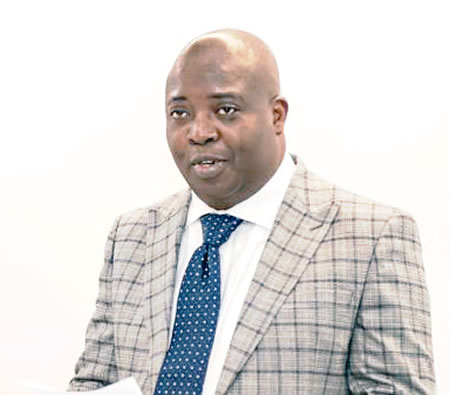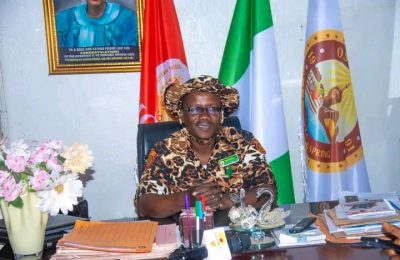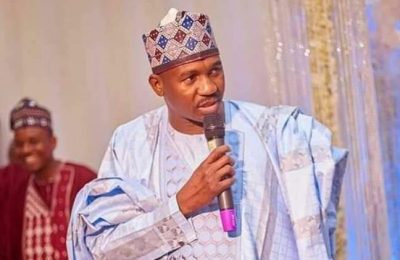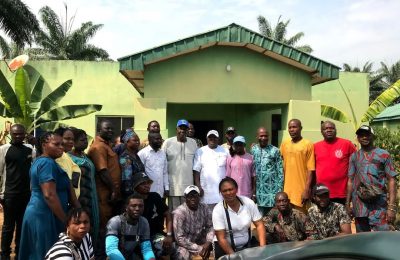

Patrick Funsho Obidoyin, a telecommunications professional and entrepreneur, is the chairman, Nigeria Society of Engineers (NSE), Manchester branch, United Kingdom. In this interview, he told SEGUN KASALI how he has been navigating life’s journey.
YOU have spoken of a happy childhood. Tell us about it.

I had a very happy childhood, I would say because growing up, Nigeria was really much better; we could play outdoors and we participated in inter-house competitions and some of those things which actually bring the community together. And I see myself as a Wazobian because I was born in Kano State which is in the northern part of Nigeria and I had my early education in Rivers State in the South-South of Nigeria, but I am from the South-West.
How did that shape your worldview?
It has helped me in a positive way to see every other Nigerian and African as my brother and as a partner in progress. So, it is very easy for me to associate with those from those areas and understand them better because I grew up there. And that is why I am very active in the community here. I am a former chairman, Nigerian Community Greater Manchester and also a member, Board of Trustees, Nigerian Community Greater Manchester. Having experienced growing up around the country has helped me to see myself as someone who could be a uniting force to bring about development.
Your parent(s) must have been in the public service?
Absolutely. My dad was in the military; hence, we had to move around the country and my dad was always saying travelling is part of education, which is true, because you would notice that someone who had moved around the country or the globe would have a different mindset from someone who is just around. You would be able to have a broader perspective on life. I had my primary education at Army Children School in Rivers State, which was a very rural area and agrarian community, because a lot of people in the military then participated in agriculture. We ate what we grew and we grew what we ate. Being a Catholic, I volunteered in the church and I ended up in the junior seminary.
Military and discipline go together. Was your dad a disciplarian at home?
Yes, he was a disciplinarian but at the same time, a very good Christian. I think his way of engaging was not very forceful, unlike some other military parents we saw around. At a time, he was the chairman, Catholic Men’s Organisation within our parish. So, he felt living an exemplary life was much better to getting people to engage rather than being forceful.
What are the traits you got from him and your mom?
Being honest and being my brother’s keeper. I think I would say those are the traits I took from him. He was a people’s person. He always wanted to help. He volunteered within the community. I remember then he was a pharmacy technician and was working in the hospital. Considering his status many people would go to him at a time. I remember some of his colleagues or subordinates, sometimes, would say this medicine is not available, but, the reverse was the case with him. So, I think I took that generosity from him. I knew my mom shouted a lot trying to put us in check, but that was when we were really much younger. When we grew up, it was more about admonition and all they were doing for us was to give us a good upbringing. She is a businesswoman, a trait, I would say, I took from her because I remember my dad was not really a good business person. I remember a time he had a camera and would take pictures of people and eventually give it to them for free. But, my mom had always been a good business person.
Were there pranks you indulged in as a lad?
I don’t think I did anything different from what they do now. As I said, I went to a boarding seminary and there were times we would have a reading time. After being fatigued during the day, some people would sleep and you would have to probably use something like a tape to cover their mouths in their sleep. So, those were just the little pranks.
Do you have any nickname in school?
The nickname I had in secondary school then was ‘Alagbara’. This name came from another student who was Igbo but was living in Lagos. It was not because I was displaying strength, but I think it was subtle strength. Whenever I said yes to something and if I believed in it, I would stand my ground. I think that was how the name came about from a boy called James Samson, whose parents were working in Shell in Lagos, but wanted him to have Igbo upbringing and decided to send him back to the East for his education.
Why did you study Engineering?
As far back as primary school, I had wanted to be three things – priest, engineer and lawyer. Rather than not knowing what I wanted to do, mine was having too many options and trying to narrow them down. I think very quickly I realised that to be a lawyer, I needed to study Arts subjects and to be an engineer I needed Science subjects. As I moved into junior seminary, I decided that my options would be broader if I did Sciences. It is easier to do Sciences and do something in other fields rather than the other way round. Another reason was that my dad’s younger brother is a mechanic and he probably influenced my choice. He never spoke to me about anything engineering but I saw him fixing things. As it was in those days, I felt mechanical engineering was a bit too dirty and as I moved on in the seminary, I felt that electrical engineering was still much better. So, I settled for that at Ladoke Akintola University of Technology (LAUTECH).
How was LAUTECH then?
We were the second set of students in the school. It was initially called Oyo State University and was eventually renamed. We were about 500 for the whole intake of my set. We knew each other. Some of my classmates then, Professor Abolade is the Deputy Dean, Faculty of Engineering; Professor Samson Ojoawo is the Chairman, Nigerian Society of Engineers (Ogbomoso Branch) and so many others in high places.
How did you combine social life with academics?
I was not much of a social person. I was not from a rich home so, I lived a moderate life.
What about life after university?
God works in mysterious ways. When we were in our final year, we did a project which became very notable, because it was on design and fabrication of a 2.6 metres aluminum dish, which was the first satellite dish that was placed in front of the rector’s office for many years and was being used at the vice chancellor’s office. I think a lot of our colleagues would remember that project. I remember that in fact the school wanted to commercialise that project. So, that gave us opportunity for placement during our National Youth Service Corps (NYSC) programme, but because of funding and bureaucracy surrounding institutions, plans towards the project went awry. So, I eventually worked for Scannet for about three years.
How did you meet your wife?
It was close to the end of my studies that I met my wife. My wife was studying at Bolton University and I was just finishing up at Salford University. I had attended a Catholic programme which was for youths and it was during that event that I met my wife and the rest is history.
What got you attracted to her?
I would probably say it was love at first sight. She was and still a very beautiful and quiet lady. That made me say hello to her after the event. I just went home and started having a chat with her.
Was asking her out difficult?
When we talk about being social, it is not about going to club and the rest. But, when it comes to church activity, I am really social.
READ ALSO: 2027 general elections contest between APC, Nigerians — Gov Makinde








